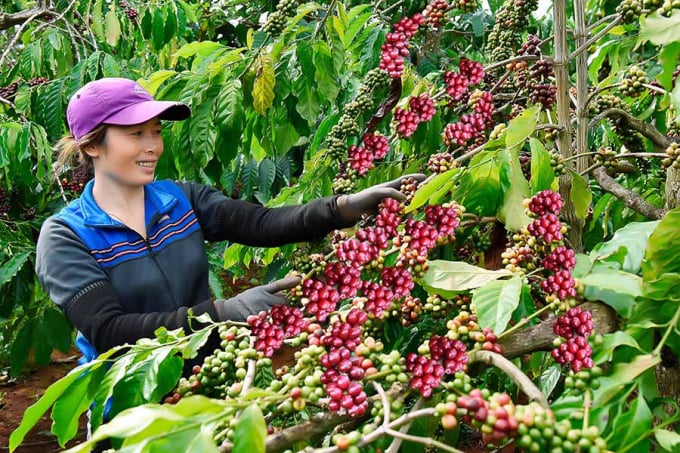May 19, 2025 | 11:42 GMT +7
May 19, 2025 | 11:42 GMT +7
Hotline: 0913.378.918
May 19, 2025 | 11:42 GMT +7
Hotline: 0913.378.918

Nescafé Plan has coached and trained more than 260,000 farmers.
Sustainable development is now the trend of Vietnam's coffee industry. Since the Vietnamese coffee industry is gradually growing, the requirements of foreign customers are consequently increasing, especially the requirements for sustainable coffee, for the process of growing, harvesting, processing, and preserving that ensure food safety standards, for traceability.
Many businesses, particularly large enterprises in the coffee industry, are stepping up the implementation of sustainable development programs.
Intimex Group, the largest coffee exporter in Vietnam, is one of the pioneers to participate in the sustainable development trend by collaborating with international organizations to implement sustainable coffee programs such as UTZ, 4C... in key material areas such as Gia Lai, Dak Lak, Lam Dong, Dak Nong.
In 2020, despite being affected by the Covid-19 epidemic, Intimex Group still start a sustainable project in Gia Lai with a budget of US$ 300,000 and a 200,000 euros project in Ban Me Thuot.
This year, Intimex Group will deploy a sustainable project with a budget of 300 thousand euros in Di Linh (Lam Dong). Intimex supports 30% of the funding in those projects, the remaining 70% will be from international organizations. All these projects are located on satellites by international organizations for close management.
According to Mr. Ngo Xuan Nam, Deputy General Director of Intimex Group, sustainable projects implemented continuously over the years have helped them make a difference for the Group's coffee products. As a result, Intimex Group's position is increasingly enhanced in the coffee market.

A coffee garden produced under 4C certificate in Gia Lai
Nestlé Vietnam is also a leading company in sustainable development through the NESCAFÉ Plan project, which has been implemented since 2011 in the 4 Central Highlands provinces of Dak Lak, Dak Nong, Lam Dong and Gia Lai.
By 2020, the Nescafé Plan program has distributed over 46 million disease-resistant coffee seedlings to farmers, renovating and replanting 46,000 hectares of aging coffee. At the same time, the program helps farmers build a management tool "Farmer's Diary" based on digital technology to connect more closely between farmers and experts, thereby helping farmers manage production and business activities effectively, replacing paper management.
Nescafé Plan has coached and trained more than 260,000 farmers on sustainable farming techniques. As a consequence, it helps to save 40% of irrigation water, reduce 20% of the chemical fertilizers and pesticides amount (thanks to the composting of coffee bean husks as organic fertilizer instead of chemical fertilizers) at coffee gardens participating in sustainable production.
More than 21,000 households joining Nescafé Plan have achieved 4C international coffee certification. With the application of this certificate, the income of coffee farmers has increased by 30%.
As claimed by Mr. Binu Jacob, General Director of Nestlé Vietnam, Nescafé Plan has been deployed by Nestlé Group (Switzerland) in 10 countries since 2010 under the public-private partnership (PPP) model, only in Vietnam one year later.
Despite being late, Nescafé Plan in Vietnam has become a typical model of the global Nescafe Plan and has positively impacted the development of sustainable coffee in the country, contributing to improving the value of Vietnamese coffee beans on the market.
Translated by Samuel Pham

(VAN) Minister of Agriculture and Environment Do Duc Duy held a meeting with Soopakij Chearavanont, Chairman of C.P. Group, on May 15.
/2025/05/16/3800-0-nongnghiep-143756.jpg)
(VAN) Suntory PepsiCo Vietnam coordinated with the Ministry of Education and Training to implement an education program on water conservation, reaching nearly 1 million primary school students nationwide.

(VAN) Vietnam’s TH Group officially put its high-tech fresh milk processing plant into operation in the Russian Federation, marking a historic moment as the first TH true MILK cartons were produced in Russia.

(VAN) Use of high-quality broodstock and biotechnology is regarded as the most effective approach to ensuring sustainable and economically viable shrimp aquaculture ahead of climate change and the emergence of increasingly intricate disease patterns.

(VAN) Carbon farming is a form of agricultural practices that helps absorb more greenhouse gases than it emits, through smart management of soil, crops, and livestock.

(VAN) This is a key content of the Memorandum of Understanding recently signed between the Vietnam Fisheries Society and Kunihiro Inc of Japan.

(VAN) To achieve the goal, local authorities and businesses in Kon Tum province have fully prepared the necessary conditions for the new Ngoc Linh ginseng planting season.